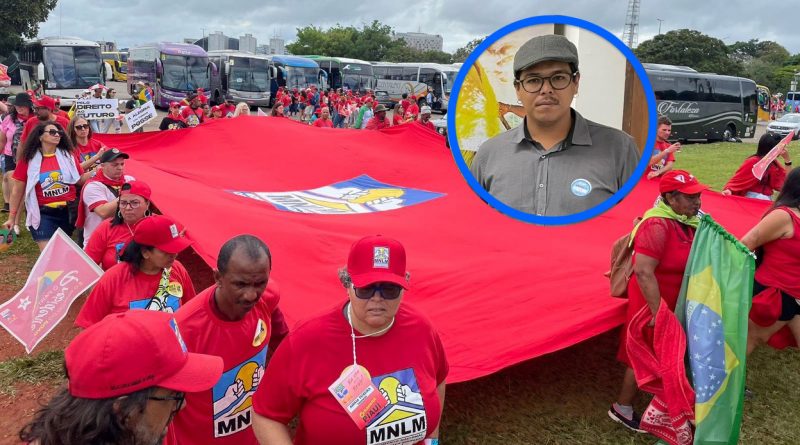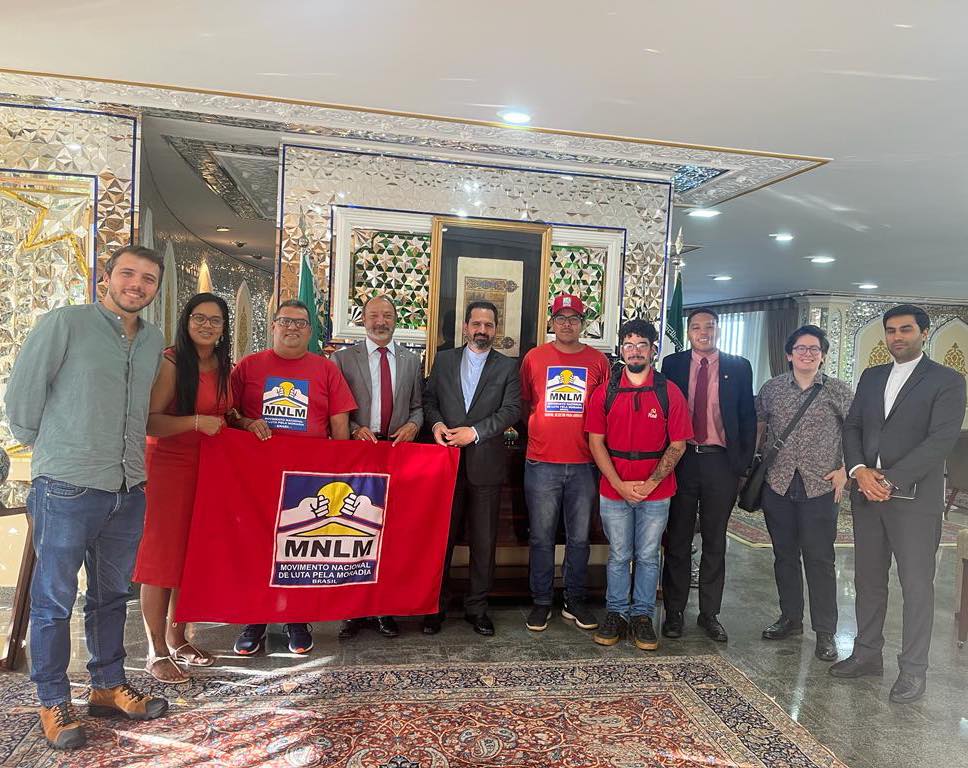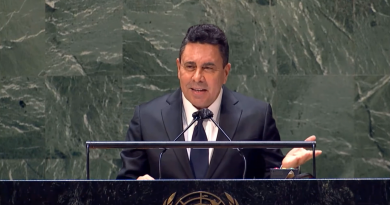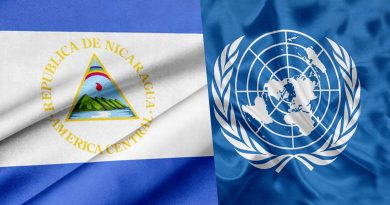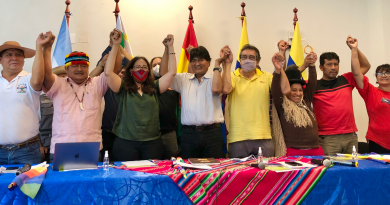Anti-imperialist push from the Brazilian grassroots: Interview w/MNLM leader Gabriel Araújo
Overshadowed by the media frenzy surrounding Lula’s new term in office, Brazil’s social movements are vowing to remain mobilized to push for policies favorable to the working majority. They’re also engaged in the fight against imperialism with hopes of steering foreign policy towards solidarity, amid pressure by North America and Europe to join intervention campaigns currently targeting several countries.
We contacted the National Movement for the Fight for Housing (MNLM) after seeing that representatives of the urban movement had visited the embassy of Nicaragua, in a show of solidarity.
Gabriel Araújo, of the the National Directorate of the MNLM, describes some of the main work being carried out by the movement on domestic issues and it’s position towards China, Russia and countries of Latin America which have been the target of media smear campaigns. Below is a transcription of our interview.
Camila:
First of all, can you explain what the MNLM is?
Gabriel:
First of all good morning Camila, good morning to all the audience. The National Movement for the Fight for Housing (MNLM) is a movement with that is active in 20 Brazilian states. Its main goals are the fight for urban reform, dignified housing and socialism.
It’s a movement that fights for socialism in the current time in which we live. It’s a movement that fights against imperialism, which is the main enemy of the struggle for socialism, urban reform and dignified housing.
We took part in the fight for the City Statute [in 2001] in the fight for the implementation of the Minha Casa Minha Vida housing program and for the creation of the Ministry of the Cities. More recently we fought for the reestablishment of these three instruments that were designed to garantee the right to the city and we supported President Lula’s campaign so that we could resume democracy in Brazil.
Camila:
Regarding here in Brazil, what are the initiatives that the movement has? And what are the initiatives that the movement has in relation to trying to promote socialist policies to be taken by the federal government?
Gabriel:
Well, we should clarify there are no measures that are socialist under this current federal government, nor have they ever existed in Brazil. This current federal government manages the capitalist state. It’s a left-wing government, geared towards the working class, which implements social policies. Among these social policies it is reestablishing the Minha Casa, Minha Vida housing program – this has been the main policy in which National Movement for the Fight for Housing is inserted.
There is a subprogram called Minha Casa, Minha Vida Entidades which supports neighborhood associations, cooperatives and and popular social movements to manage their own, autonomous social housing construction projects.
We’ve also been working together with the General Secretariat of the Presidency, which is a secretariat with ministerial status that aims to increase popular participation.It’s a secretariat dedicated to stimulating the process of political emancipation in the country.
So, these have been our main ways of acting, together with the federal government and with institutions.
However, we mainly work outside of institutionality, through the organization of new communities, by occupying vacant land and buildings that do not fulfill any social function. We have tried to mediate this process of struggle beyond the institutions, by popular political organizing, organizing with the working class and the excluded but we also work to carve out spaces within institutions so that they become tools to strengthen the struggle for socialism in Brazil.
Camila:
Could you explain what the Anti-Imperialist Committee is why it’s so important to show solidarity with Nicaragua, as you did recently when you visited the embassy in Brasilia?
Gabriel:
Well, the Committee, is an initiative that aims to unify popular organizations, unions, leftist parties as well as activists, militants, people who sometimes are not part of any formal organization but want to contribute to anti-imperialist struggle. The General Abreu e Lima Anti-imperialist Committee has this objective of unifying the struggle around the demands of the peoples oppressed by imperialism.
We’ve worked to establish a relationship of solidarity, of partnership with the countries that are oppressed by imperialism and for us to be able to contribute to the fight.
For example, during the last administration, fascists here in Brazil and the coup leaders who ousted President Dilma wanted to expel the diplomatic representation of Venezuela from Brasilia, because the previous government (of Jair Bolsonaro) didn’t recognize the government of President Nicolas Maduro. The Committee, together with other popular movements, the MST, and the MNLM, among other organizations and unions and leftist parties, defended the embassy and structured a brigade at that embassy of Venezuela to prevent fascists from taking over the embassy as the diplomatic representation of the Juan Guaido puppet government was trying to take over.
Cuba has been facing difficult economic problems, caused by sanctions and embargoes. We’ve been donating medication, mobilizing in other ways to lend our support.
In similar fashion, with regards to Nicaragua, we’ve denounced these attempts made by imperialism through the United Nations, the European Union, the United States, to destabilize the government and attempt a coup d’état. Who knows, in the future, they could try to wage a military intervention against the country.
So we have established contact with the diplomatic representation of Nicaragua and other countries that are oppressed by imperialism, so that we can build solidarity from within Brazil.
We do this so that the federal government of Brazil will take a position, which must be a position of solidarity, of mutual help, without attacking these other countries, and instead contributing to these countries and their ability to develop, striving towards unity throughout the continent to fight our true enemy, which is imperialism.
Camila:
Does the General Abreu e Lima Anti-imperialist Committee also have a position in relation to the posture that Brazil has adopted in relation to other countries, specifically China?
Gabriel:
Regarding the issue of China, we believe that they are great partners of ours and that we have to deepen relations with China. When it comes to an assessment of the federal government, we see that the government is politically, institutionally weak. By this I mean that they don’t control the Congress and has little influence in the armed forces and Supreme Court.
That puts the government in a tough spot and the only alternative is popular mobilization and that tool has been seldom used during these three months of government. What we want is to provide the possibility of greater autonomy for the government for both governing on international issues and domestic ones.
The government has to walk on egg shells. Brazil has to be careful not to cause any rupture that is too big which might upset the United States, which is one of Brazil’s main trading partners.
This is our position as a movement. It’s not the same as the government’s position, but there is a shared understanding of this situation. What we seek is to establish a dialogue with the government and, through popular mobilization, lead the government towards a process of independence from the United States.
With regard to other issues such as trade partnerships, I’ve had discussions with some comrades over holding a seminar which would be focused on the issue of housing issue in Latin America. In that, we’d seek the contribution of our comrades from Nicaragua, Cuba, Bolivia, and Venezuela, to look at possible partnerships between Brazil and these countries.
For example, China has just closed an agreement with Nicaragua for the construction of 14,000 housing units in Nicaragua. Brazil has one of the main civil construction industries on the continent. The construction industry was even used in attacks during the coup in and Operation Lava Jato.
So if the Chinese are establishing trade and development relations with Latin American countries here, like Nicaragua, why can’t Brazil also contribute to this? If we have companies that have this capacity, we have banks the size of the BNDES that can contribute to financing this, this type of initiative. Why doesn’t Brazil promote this partnership with these countries? So we want the Brazilian government, Itamaraty (the Foreign Ministry), the Ministry of Industry, the Ministry of Cities and the Brazilian parliament itself to start thinking about these alternatives, and this would generate jobs in Brazil itself.
Brazil is now signing a contract with Argentina to build a new gas pipeline in Argentina, where much of the technology that will be implemented there will be Brazilian companies.
Brazil needs to place itself in the international political and economic scenario to be able to establish partnerships with these countries but also without entering a direct confrontation with China, because it’s also important for us to have good relations with the Chinese. At the same time, we also need to place ourselves as leaders here within the American continent.
Camila:
Now, briefly, regarding the Russian Federation. What is Russia’s role in relation to Brazil with regards to a strategic partnership?
Gabriel:
Well, I believe that it’s extremely pertinent to go into the issue of the change that is taking place in the international financial system itself, with the partnership between Russia and China, to enter into a process of de-dollarization of our economy.
We also believe it would be very important for Brazil to strengthen relations with the Russian defense industry.
It’s obvious that there is international competition. Brazil was once the fourth largest military industry in the world. Today it’s arms industry is deteriorating. A few days ago, President Lula visited a naval shipyard to talk about restarting our nuclear submarine construction program in partnership with France, with technology transfer from France.
Brazil should resume its defense and oil extraction partnerships with Russia. It’s also necessary to support Russia in the war in Ukraine, which is actually a proxy war by the United States and NATO to attack Russian territory.
We know that since the implementation of neoliberal policy, great nations were divided with the purpose of imposing imperialism. That’s what they want to do here with the Amazon, and that’s what they want to do with Russian territory. And we need to unite to fight imperialism and NATO. We will not have peace on Earth without the destruction of NATO. Russia is certainly an important ally for us to face this evil, NATO, which causes great damage to humanity.
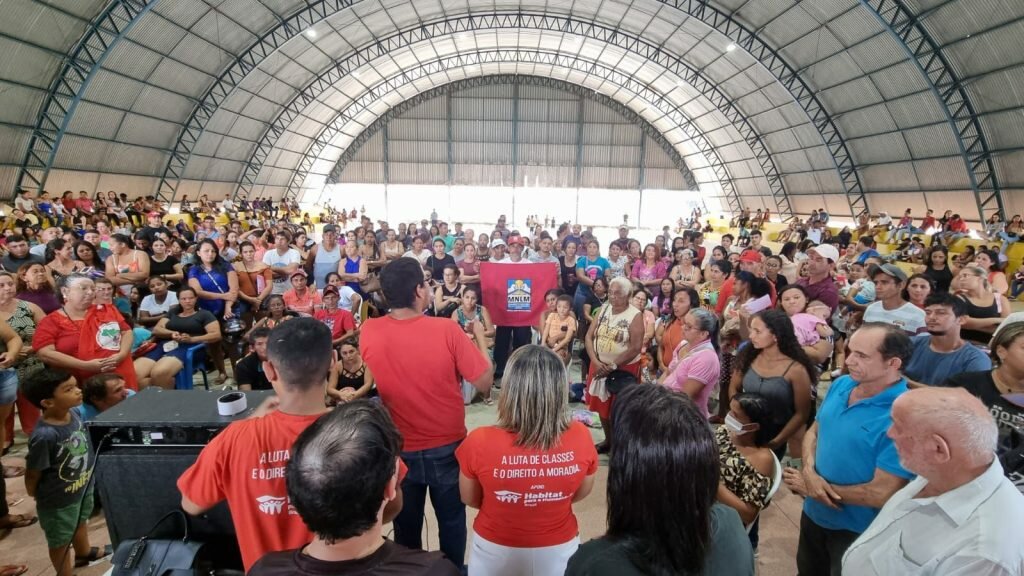
Camila:
So, obviously, the movement has a conscious and informed position on these issues, but these are not necessarily the perspectives of all people in Brazil. In particular, on things like Lula’s friendliness with Venezuela. Particularly during the election campaign, there was a lot of misinformation and fake news.
Gabriel:
Well, regarding the issue of misinformation, we believe that lies are fought with the truth. Fighting lies through the courts is a very big mistake, because within the courts, within the Judiciary, you can have people like Sergio Moro, the judge who issued the arrest of President Lula.
This measure of arresting people, might work with one or two small fish of Bolsonarismo, of fascism, of the coup plotters. But they won’t go after the big figures. For example, you are not going to see a general from the High Command of the Armed Forces being arrested or an admiral. You won’t see a STF judge, or an anchor from Rede Globo, CBN, Folha de São Paulo, from Estadão being arrested for spreading lies.
It’s the bakery owner, the worker, the peasant, the black man, the indigenous person who will be arrested. So, we contend that the left needs to work to convince the population, work that requires concrete political struggle.
We believe that on this issue, the lies and false news must be fought. To be able to both combat fake news, but also to dis-aggregate this accumulation of political force around Bolsonarismo, it’s necessary to have a clear political and economic program.
And what can dis-aggregate these political forces? Having credit for the small entrepreneur, having debt forgiveness and you having taxation of large fortunes and you increasing the number of vacancies and the number of scholarships within universities while increasing the number of public schools. It’s through these economic responses, which are very slow to come about in Brazil.
In the world in general, as we can see, the issue of inflation is completely out of control. Europe is in turmoil, Germany is in turmoil, France is in turmoil. UK has changed Prime Ministers twice now. By responding to these economic questions you’ll be able to speak to this middle section of the population which is prone to fascist understandings, and falling to the discourse of the bourgeoisie which blames workers and countries oppressed by imperialism.
Through providing economic answers to this segment of the population, we’ll be able to break this ideological blockade and these people will start to group around our ranks. It’s not through more repression that we’ll be able to dis-aggregate Bolsonarismo.
It’s by providing concrete political responses and implementing the government program that we elected at the ballot box, that we will be able to defeat Bolsonarismo.
Camila: Thank you for your time Gabriel.
Gabriel: Thank you very much.
By Kawsachun News
